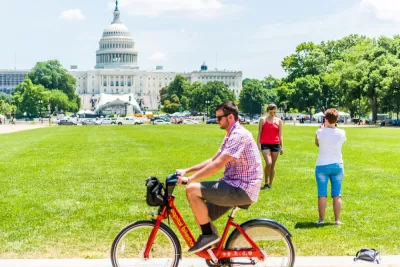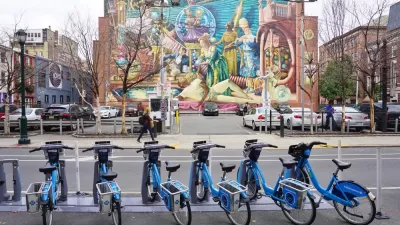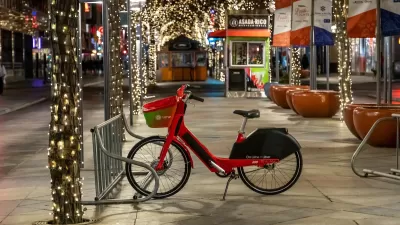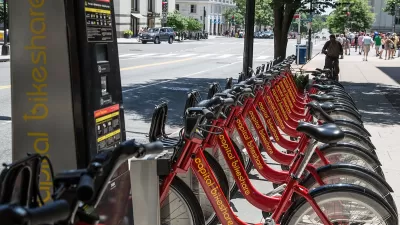New research shows that bike share use has a positive impact on public health, even in less bikeable cities.

According to a new study from Colorado University–likely "the first study to quantify the public health benefits of U.S. bicycle sharing systems"–bike share systems "saved the national healthcare system more than $36 million, despite the fact that there are only about 100,000 shared bikes in the country and many are located in dangerous, car-dependent cities." Bike share users, writes Kea Wilson, "were saved a collective total of 737 'disability adjusted life years,' or years spent living with debilitating health conditions such as cancer, dementia, and ischemic heart disease, thanks to the preventative power of active transportation."
But "the life-saving potential of bike share is limited by the deadly reality of car dominance. The researchers found bike share users had a marginally higher risk of dying in traffic crashes or from pollution-related ailments compared to drivers or transit riders, although they also had a much lower risk of dying from diseases related to physical inactivity than their inactive counterparts." However, no U.S. bike share users were killed between 2007 and 2014, making it a remarkably safe travel mode. David Rojas-Rueda, one of the study's authors, says "the remaining risks of bike share can be mitigated through good Vision Zero planning. But the public health risks associated with sedentary modes such as driving are baked in."
FULL STORY: Study: Bike Share Saves the U.S. $36 Million Public Health Dollars Every Year

Manufactured Crisis: Losing the Nation’s Largest Source of Unsubsidized Affordable Housing
Manufactured housing communities have long been an affordable housing option for millions of people living in the U.S., but that affordability is disappearing rapidly. How did we get here?

Americans May Be Stuck — But Why?
Americans are moving a lot less than they once did, and that is a problem. While Yoni Applebaum, in his highly-publicized article Stuck, gets the reasons badly wrong, it's still important to ask: why are we moving so much less than before?

Research Shows More Roads = More Driving
A national study shows, once again, that increasing road supply induces additional vehicle travel, particularly over the long run.

Harnessing the Power of Fungi for Environmental Cleanup
Mycoremediation — the use of fungi to break down or absorb environmental pollutants — offers a promising, cost-effective, and eco-friendly alternative to conventional methods for restoring contaminated sites.

For Advice on Accessibility, Look to Iceland
Cities around the country installed over 1,700 wheelchair ramps in the last five years, thanks in part to one man’s initiative.

Toyota’s Hybrid Popularity Outpaces Production Worldwide
Soaring global demand for Toyota's hybrid vehicles is straining the automaker’s supply chain, leading to widespread delays as component shortages and limited production capacity challenge its ability to keep up.
Urban Design for Planners 1: Software Tools
This six-course series explores essential urban design concepts using open source software and equips planners with the tools they need to participate fully in the urban design process.
Planning for Universal Design
Learn the tools for implementing Universal Design in planning regulations.
Heyer Gruel & Associates PA
City of Moreno Valley
Institute for Housing and Urban Development Studies (IHS)
City of Grandview
Harvard GSD Executive Education
NYU Wagner Graduate School of Public Service
City of Cambridge, Maryland
Newport County Development Council: Connect Greater Newport





























